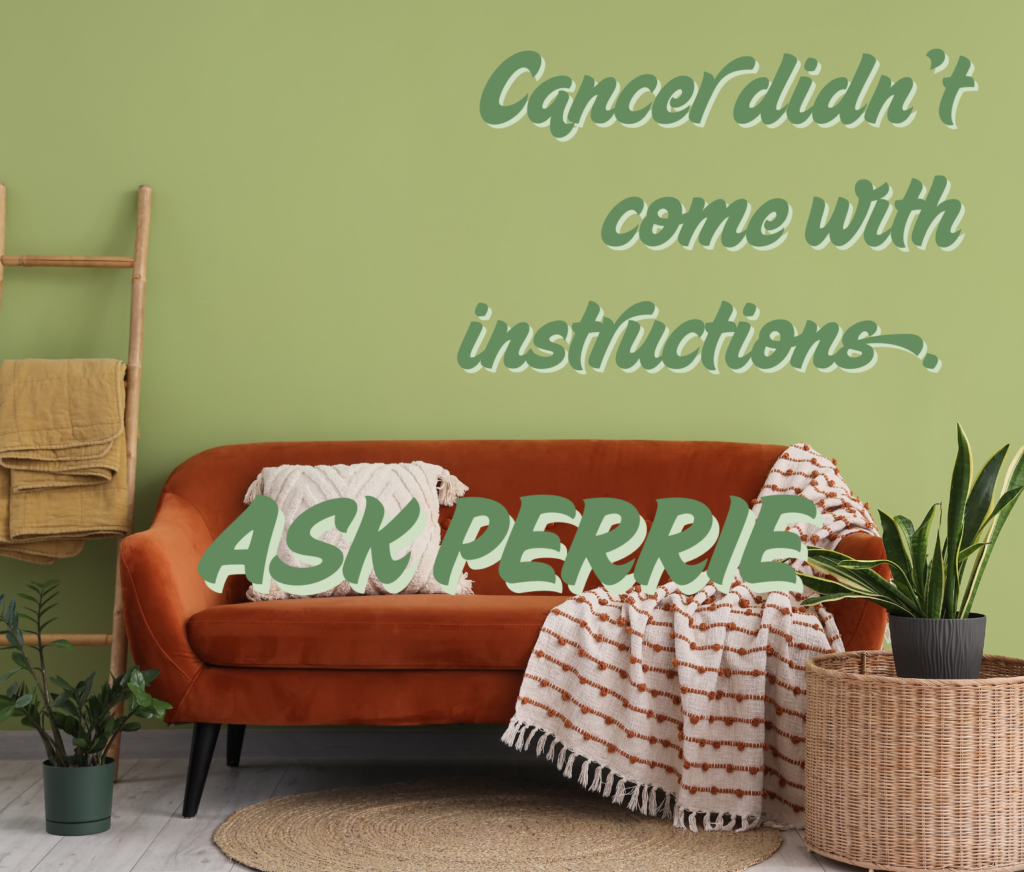National Family Caregiver Month
November is National Family Caregiver Month, and we’re shining a light on the incredible people who carry the weight of young adult cancer right alongside their loved ones. You juggle appointments, meds, emotions, and everything in between and still show up with love. At Cactus Cancer Society, we see you. In this post, we’re diving deeper into what it really means to be a caregiver, the mental health toll it can take, and how to care for yourself while caring for someone else.
What is a Co-Survivor?
In the young adult cancer world, the term co-survivor describes anyone walking alongside someone through cancer. It includes partners, friends, siblings, parents, and chosen family, and it recognizes that survivorship does not belong to one person alone. Cancer is not an individual experience; it ripples through relationships, homes, and communities.
Research shows that caregiving and co-survivorship are among the most emotionally demanding roles a person can hold. Caregivers often report high levels of stress, anxiety, and depression, sometimes even higher than those of the patients they support (Geng et al., 2018). They can live in a constant state of vigilance, balancing logistics and emotional labor while quietly absorbing the uncertainty, grief, and fear that come with a diagnosis.
According to Kershaw and colleagues (2022), the health of the caregiver deeply affects the health of the person with cancer. Emotional distress, poor sleep, and physical strain are common and can influence how effectively a caregiver supports their loved one. Yet despite this, caregivers are often called the “invisible patients,” their needs overlooked in favor of the one receiving medical treatment. Recognizing the caregiver as a co-survivor reframes that reality. It honors the truth that while one person undergoes treatment, another walks beside them through every scan, decision, and sleepless night.
The Impact Of Caregiving on Relationships & Sense of Self
For young adults, caregiving can be especially complex. Life at this stage usually revolves around growth, independence, and new beginnings. Cancer changes that. Partners may shift from equals to caretakers. Parents may need to step back into hands-on roles they thought were behind them. Friends who once shared social circles may suddenly become primary sources of medical and emotional support. These shifts can alter the balance of relationships in ways that are both tender and painful. A romantic partnership can begin to feel more like a nurse-patient dynamic. Intimacy can fade under the weight of exhaustion and fear. Some caregivers describe feeling both deeply connected and profoundly lonely at the same time.
Another reality many caregivers face is role engulfment, when caregiving consumes every other part of life. Your own needs, friendships, hobbies, and goals can fall away. You begin to feel like a supporting character in someone else’s story instead of the author of your own. That feeling can linger long after active treatment ends. Learning to reclaim your identity is part of co-survivorship. You are not only the helper. You are a person with your own dreams, grief, humor, and humanity.
Mental Health Challenges in Caregiving & Co-Surviving
Caregiving can be a quiet storm of emotions. It brings pride and meaning, but also anxiety, fatigue, and heartbreak. Many caregivers describe living in a constant state of survival, where the body stays tense and the mind never entirely rests. Anxiety and anticipatory grief are common, as uncertainty about scans, treatment outcomes, or the future can keep the nervous system on high alert. Over time, this can lead to emotional burnout, sadness, or numbness. Burnout is not a weakness. It is the body’s natural response to chronic stress!
Financial stress compounds these challenges. Many young adult caregivers juggle medical bills, household expenses, and lost income from missed work. Some rely on limited paid leave or family medical leave (FMLA), but even with those protections, the financial and career strain can be heavy. A study by Kim and Given (2008) found that financial hardship significantly increases psychological distress in cancer caregivers. Balancing caregiving with professional life can also feel impossible. Caregivers often face reduced hours, career setbacks, or fear of job loss. For those using FMLA, unpaid leave can create a tough trade-off between income and presence. Employers may not fully understand the unpredictable nature of cancer care, leaving caregivers to constantly justify their absences.
Isolation often creeps in, too. Many young adult caregivers feel cut off from their peers, who may be focused on milestones like travel, weddings, or career advancement. When your day revolves around medical appointments and medication refills, it can feel like you are living in a completely different world. Guilt also runs deep. No matter how much you give, it can feel like it is never enough. That guilt can prevent caregivers from taking breaks or asking for help. But rest is not selfish. It is essential.
Caregiving can change your worldview in ways that are both painful and profound. It challenges your patience, tests your limits, and sometimes brings you face-to-face with your own fears. Yet within that difficulty, there can also be growth. The theory of posttraumatic growth suggests that people who face major stressors often discover new strengths, deeper relationships, and an expanded sense of purpose (Tedeschi & Calhoun, 2004). That does not mean the experience was meant to happen or that it is easy. It simply means that meaning can exist alongside pain. Caregiving teaches emotional flexibility, the ability to sit with fear and love at the same time. It shows that you can break down and still show up. It reveals how much capacity you have for compassion, even when your own heart feels tired.
Coping, Tips, & Wellness as a Caregiver or Co-Survivor
Boundaries
Caring for someone with cancer is emotionally and physically demanding, but it does not have to come at the cost of your own well-being. Boundaries are an act of love, not rejection. Setting limits on what you can do allows you to sustain the care you provide. This is similar to the metaphor you may hear about “putting on your own oxygen mask first.” And it’s true, if you prioritize your wellness and set boundaries around your self-care, you can show up better in a caregiving/co-survivor role.
Micro-moments & Scheduling Joy
Caregiving rarely leaves room for long weekends or spa days, but small moments can still make a big difference. Micro-moments of rest are the quiet pauses that remind your body you’re still here, still human, still allowed to breathe. Take a few deep breaths before bed, listen to your favorite song in the car, or step outside and let the sun hit your face for five uninterrupted minutes. These tiny acts are not frivolous; they’re messages to your nervous system that it can stand down for a moment.
And just as you schedule appointments, scans, and reminders for your loved one, schedule moments of joy for yourself. Pencil them in. Protect them. Whether it’s a call with a friend, a walk with your dog, or a few minutes to doodle in a notebook, these little rituals can anchor you in something steady and good. Caring for someone else starts with remembering that you deserve care too.
Maintaining Your Identity
It can be easy to lose sight of yourself when every day revolves around someone else’s needs. But you are more than a caregiver. You’re still a partner, a friend, an artist, a student, a dreamer, the person you were before cancer entered the picture. Keeping pieces of your own life alive isn’t selfish; it’s how you stay whole. Revisit a hobby that used to bring you joy, watch that show that makes you laugh even when you’re tired, or set up a standing call with a friend who reminds you who you are outside the world of appointments and updates. These small acts of self-preservation help protect your identity and can give you the emotional stamina to keep showing up with love.
Mental Health Therapy
Therapy can be a grounding place to unpack the mix of guilt, fear, and exhaustion that caregiving & co-surviving often bring. Working with a therapist who understands chronic illness, grief, or caregiver burnout can help you find language for what you’ve been carrying. Evidence shows that Acceptance and Commitment Therapy (ACT) and Cognitive Behavioral Therapy (CBT) are effective in reducing anxiety and depression among caregivers (Hayes et al., 2011; Hofmann et al., 2012).
But healing doesn’t always happen one-on-one. Peer spaces, like Cactus Cancer’s Caregiver Hangout, can be equally powerful. Sharing your story with others who just get it can ease the isolation that often comes with caregiving. Research shows that social support plays a protective role, helping caregivers manage stress and build resilience (Uchino, 2006). You deserve care, too, and it’s okay to reach for it in whatever form feels most healing.
Self-Compassion
Caregiving often comes with impossible standards. You might feel like you have to be calm, organized, and endlessly patient, like there’s no room for your own breaking points. But perfection isn’t the goal. Compassion is. Self-compassion, as defined by researcher Dr. Kristin Neff, comprises three parts: self-kindness, common humanity, and mindfulness. Self-kindness means speaking to yourself with warmth instead of criticism, especially when you’re struggling. Common humanity is the reminder that you’re not alone in this. Millions of caregivers have felt the same mix of love and exhaustion, guilt and gratitude. And mindfulness is the practice of noticing your emotions without judgment, allowing yourself to feel them fully, without getting swallowed by them.
So when you catch yourself thinking, “I should be doing more,” pause and ask: “What would I say to a friend who felt this way?” You’d probably tell them they’re doing their best. You’d tell them to rest. You’d tell them they’re enough. That same gentleness belongs to you, too. Self-compassion isn’t indulgent. It’s a resilience skill. Research shows that people who practice self-compassion experience lower levels of anxiety, depression, and caregiver burnout (Neff & Germer, 2018). It’s emotional medicine, the kind that helps you keep showing up without losing yourself in the process.
We are Here to Help
Caregiving and co-survivorship are acts of love. They require patience, adaptability, and more heart than most people will ever understand. But you are not alone. This November, we honor the caregivers who give so much of themselves to others. Through art, community, and conversation, we hope you find a little of what you give away every day — care, understanding, and space to be you.
Our Hangin’ with Our Pies program is a heartfelt nod to caregivers, co-survivors, and chosen family. It is a creative night built around gratitude and connection. We gather, make art, and share stories that remind us what community looks like when love shows up in all its forms. This year, we will also introduce our Digital Gratitude Wall, a space where survivors, caregivers, and supporters can post shoutouts to the people who make care possible. Gratitude practices are more than good manners. Studies show they can lower stress and strengthen emotional resilience (Kerr et al., 2015). This event is not about ignoring hardship. It is about honoring the complex beauty of caregiving relationships, where exhaustion and appreciation coexist.
Our Caregiver Hangout offers another way to connect and breathe. It is a low-key virtual gathering where caregivers can exhale, talk openly, and be with others who understand what it means to love someone through cancer. There is comfort in sitting among people who do not need you to explain what “scan week” means or why you check your phone like it is a lifeline. Peer support has been shown to reduce depression and improve coping for caregivers (Uchino, 2006). Beyond research, it simply feels good to know you are not alone, that your exhaustion, tenderness, and humor all have a home here.
References
Geng, H. M., Chuang, D. M., Yang, F., Yang, Y., Liu, W. M., Liu, L. H., & Tian, H. M. (2018). Prevalence and determinants of depression in caregivers of cancer patients: A systematic review and meta-analysis. Medicine, 97(39), e11863. https://doi.org/10.1097/MD.0000000000011863
Hayes, S. C., Strosahl, K. D., & Wilson, K. G. (2011). Acceptance and Commitment Therapy: The process and practice of mindful change. Guilford Press.
Hofmann, S. G., Asnaani, A., Vonk, I. J. J., Sawyer, A. T., & Fang, A. (2012). The efficacy of cognitive behavioral therapy: A review of meta-analyses. Cognitive Therapy and Research, 36(5), 427–440. https://doi.org/10.1007/s10608-012-9476-1
Kim, Y., & Given, B. A. (2008). Quality of life of family caregivers of cancer survivors: Across the trajectory of the illness. Cancer, 112(11 Suppl.), 2556–2568. https://doi.org/10.1002/cncr.23449
Kerr, S. L., O’Donovan, A., Pepping, C. A., & Canale, N. (2015). The role of gratitude in well-being: A review and theoretical integration. Clinical Psychology Review, 40, 177–187. https://doi.org/10.1016/j.cpr.2015.05.002
Tedeschi, R. G., & Calhoun, L. G. (2004). Posttraumatic growth: Conceptual foundations and empirical evidence. Psychological Inquiry, 15(1), 1–18. https://doi.org/10.1207/s15327965pli1501_01
Uchino, B. N. (2006). Social support and health: A review of physiological processes potentially underlying links to disease outcomes. Journal of Behavioral Medicine, 29(4), 377–387. https://doi.org/10.1007/s10865-006-9056-5
Kershaw, T., Ellis, K. R., Yoon, H., Schafenacker, A., & Northouse, L. (2022). The invisible patient: Understanding and improving family caregiver quality of life. CA: A Cancer Journal for Clinicians, 72(5), 402–417. https://doi.org/10.3322/caac.21729
Neff, K. D., & Germer, C. K. (2018). The Mindful Self-Compassion Workbook: A proven way to accept yourself, build inner strength, and thrive. Guilford Press.








